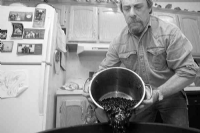 PAYSON, Utah – Rick Johnson is the archetype of an American cowboy, with a dress code based entirely on leather and denim. He wears the classic black boots and a wide-brimmed cowboy hat at all times, even though you are much more likely to find him out in the hills picking berries than in the fields herding cattle.
PAYSON, Utah – Rick Johnson is the archetype of an American cowboy, with a dress code based entirely on leather and denim. He wears the classic black boots and a wide-brimmed cowboy hat at all times, even though you are much more likely to find him out in the hills picking berries than in the fields herding cattle.
A lineup of several of Rick Johnson’s past fruit wine creations he calls “Rick’s Cowboy Coolaid” include his Choke Cherry Wine that won a medal in the 2006 Colorado Mountains
Winefest for Amateurs.
I figured I can make jelly really good, so I would just take it a step further.
Johnson, a Payson, Utah, resident, always has had a love of making jellies from the different berries he can find throughout the mountains of Utah and Colorado. But in recent years, he has shifted his attention from jellies to wines. Rather than the traditional grapes, Johnson is sticking to his tried-and-true mountain berries.
“I figured I can make jelly really good, so I would just take it a step further,” Johnson said.
The process of fermenting wine is a little more complex than making jelly, but Johnson had the guidance and help of the former owner of the Rocky Hill Winery. In a few months time, Johnson was using the same berries he used for jelly to make his own wine, which he dubbed “Rick’s Cowboy Coolaid.”
“Cowboy Coolaid” was just a small side project Johnson maintained for fun in his spare time while working in construction, and he never had a chance to get the old Colorado winery running and selling wine. In 2008, Johnson got a full-time job with Okland Construction that moved him to Utah, where state alcohol laws prevented him from continuing his newfound love of winemaking.
During the 2009 legislative session, House Bill 51 sought to amend the alcohol-production license laws to allow home brewers and winemakers the right to continue their hobby legally in limited quantities for personal, family and competition uses only. Johnson jumped on the opportunity to participate in democracy and joined the fight for House Bill 51.
“I got a hold of Mike Morley, my representative, about (House Bill 51), and he seemed really receptive to it,” Johnson explains. “He told me to come on up to the hill where I talked to other representatives. The Beer Nut in Salt Lake City had already been working with a lot of home brewers up in Salt Lake County who were pushing the bill. They had a bill in place that they tried last year. I think it was the combination of a whole lot of people working together, and it all just came together.”
Now, Johnson can legally enjoy amateur winemaking, but he does not intend to stay an amateur very long.
For now, Johnson can lawfully produce only 100 gallons this calendar year but says that is really all he can handle making by hand in 5-gallon batches. At this stage, Johnson is refining his craft by experimenting with slight variations on his old recipes, trying new fruits and entering as many contests as he can to accumulate a reputation for his “Cowboy Coolaid” before he tries to go pro.
When he does take his craft to the market, Johnson has ambitious dreams of a vast variety of fruit wines made from choke cherries, gold rainier cherries, red raspberries, currants, elderberries, black cherries and huckleberries. And he doesn’t intend to stop there. Johnson realizes that in Utah County, wine is not the most popular commodity. And he fully appreciates the sentiment behind the abstinence from alcohol.
“I don’t want the children in my life to ever pick up drinking,” Johnson says. “My winemaking will be kept under lock and key. I don’t want the children around it or to see drunkenness. I want to have nonalcoholic ciders, juices and maybe sodas at my winery.”
For Johnson, the process of creating new recipes from new fruits is an exciting prospect. Each 5-gallon batch has a lesson that can be learned, and even the failures have a purpose in developing the perfect recipe.
While Johnson has huge dreams for the future of his wine, it is not something he expects to grow rich on. His winemaking is a hobby that Johnson has taken great satisfaction from. At the end of the day, his goal is to produce something the people around him enjoy and that he can take pride in.
“I feel that winemaking is something that I can do for the rest of my life, no matter what happens to me, my body and what ails me,” Johnson said. “I am not looking at this for my retirement. I am looking at this for something to do for the rest of my life.”
